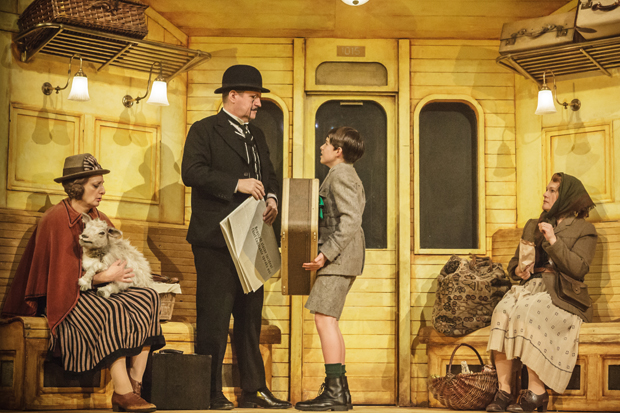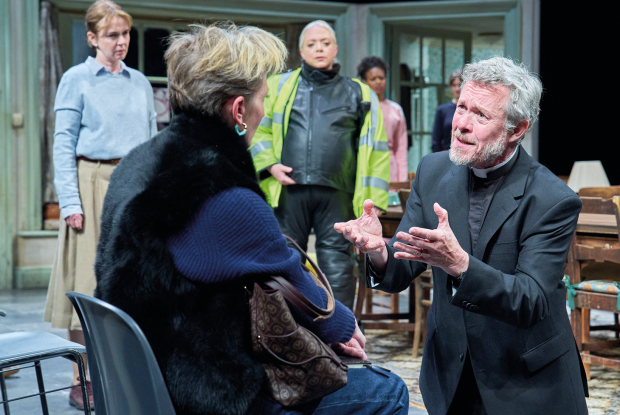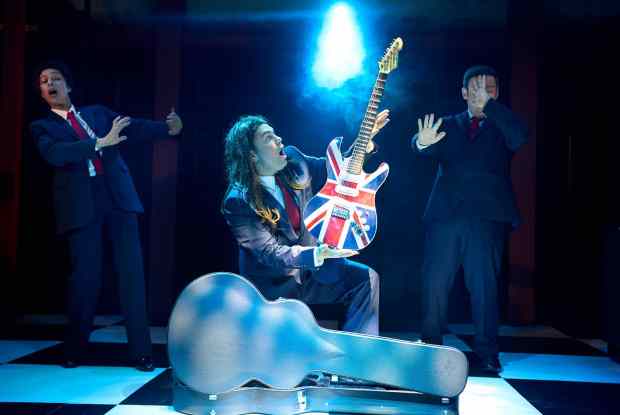It starts with a brilliant joke. We’re in the Weimar Republic in 1929. Little Emil Tischbein is listening to his mother and a moaning neighbour, Mrs Wirth, lamenting Germany’s loss of moral fibre. Mrs Wirth cites a recent gangster film whose depravity shocked her to the core. ‘We saw it three times,’ she adds. Forewarned about thieves and hoodlums, Emil travels to Berlin carrying a precious cargo of 140 marks. A sinister stranger robs him on the train and he befriends a gang of Berlin school-kids who set off to retrieve his cash.
Erich Kästner’s classic is directed with great style by Bijan Sheibani, who captures much of the book’s verve and atmosphere. The costumes are terrific, with the boys kitted out in pleated jackets, knee-length breeches, woollen socks and walking boots. They look like Mallory on his way to base camp. The paranoid jumpy mood of the German capital comes across powerfully. The streets are crowded with anxious, overworked commuters fearful of foreigners and even of junior sleuths.
Lucy Carter’s bravura lighting display deserves to win prizes. The robbery on the train is brilliantly creepy. The sewer scene, with actors wearing miners’ lamps, is an amazing piece of artistry. And there are deft references to Vorticism, with thrusting lines of neon light that dramatically foreshorten the stage and give it an apparent depth of 100 yards. If a film version is in the offing, this is a superb showcase for potential investors.
At moments the illuminations are so accomplished that they threaten to displace the story. And although children are bound to adore this show, adults may feel less than fully satisfied because the novel presents challenges that the adaptor, Carl Miller, can’t resolve. There’s no big climax to close the first act. The final scene falls flat because Mr Snow doesn’t try to defend himself adequately, which costs the drama a crucial moment of suspense. And the young cast are a problem. Reviewers tend to heap praise on kiddie thesps but I’m afraid this crew of future Gielguds are simply overworked. They have to carry large chunks of the storyline on their own, with no adult support, and although they throw everything at it they’re just too small, and too weak vocally, to fill this massive theatre.
And the plot is highly resistant to theatrical presentation. It’s a roving, restless gadabout creature that flits all over Berlin, taking in cafés, stations, banks, parks, hotels, subterranean tunnels and finally a courtroom. Theatre scripts don’t have the supreme manoeuvrability of novels, and the production runs out of puff as it rushes to keep up with itself. Take none of these remarks as discouragement. Buy seats as far forward as possible. Opera glasses might help too. Some of these little ’uns are seriously tiny.
Off to the Arts for more great adaptations. I ought to know Dickens backwards but I’m afraid I don’t even know him forwards. The only portion of his oeuvre that I’ve enjoyed in its entirety is Oliver! At A-level I squared up to Hard Times but I withdrew exhausted and befuddled about halfway through. I got a grade D in the end. Bloody Dickens. If he’d been more readable I’d have been more employable.
One of the founders of the Reduced Shakespeare Company, Adam Long, has applied the shrink-wrap technique to the complete works. Mr Long says he was brought up among bikers and computer geeks ‘in pine-covered mountains’ near San Francisco. The show is as American as a machinegun supermarket. The actors perform Dickensian skits in sunny Californian accents while strumming on acoustic guitars. And they squeeze entire novels into tightly scripted pairs of rhyming couplets. The mood is Spamalot but the tone is affectionate. And though it’s strange to see Dickens as a boy in Regency London being played by a plump hippie in a goatee beard, it works perfectly well. Indignant Victorian social satire and laid-back West Coast beach-bum ditties appear to be made for each other. The clue may lie in Dickens’s universality. Or perhaps the show’s secret is that Americans love Dickens because he exposed the motherland’s corrupt and brutal heart. And he told them what they wanted to hear, that they were right to walk out and never come back. Even when he insulted them — by advising the Virginians, for example, that slavery was immoral — he quickly earned their forgiveness.
The show, on semi-permanent tour under various titles since 2007, has a cosy, pipe-and-slippers feel. The highlight comes in act two when Tiny Tim hobbles on stage with a crutch that turns into a startling American prop. It ought to be a machine gun. It isn’t.
Got something to add? Join the discussion and comment below.
Get 10 issues for just $10
Subscribe to The Spectator Australia today for the next 10 magazine issues, plus full online access, for just $10.
You might disagree with half of it, but you’ll enjoy reading all of it. Try your first month for free, then just $2 a week for the remainder of your first year.














Comments
Don't miss out
Join the conversation with other Spectator Australia readers. Subscribe to leave a comment.
SUBSCRIBEAlready a subscriber? Log in